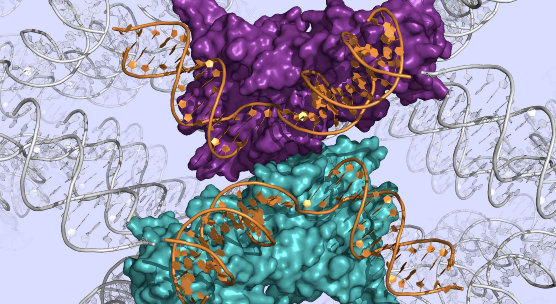DNA repair enzyme mapped in atomic detail
Published On Thu 10 Dec 2015 by Roddy Isles

An enzyme crucial to the process of DNA repair in our cells has been mapped in atomic detail by researchers at the University of Dundee, the UK’s top-rated University for Biological Sciences.
DNA repair plays a key role in human diseases such as cancer. Researchers say that revealing the 3D molecular structure of a key enzyme involved in this process could be an important step towards developing future drugs.
DNA is the genetic `library’ of the cell and is so important that it must be repaired when damaged. It is the only kind of molecule in the cell that is subject to such repair. In one such process, DNA temporarily forms interconnections, called junctions, that much be processed by special enzymes, including one called GEN1, which has now been mapped by the Dundee team.
“GEN1 was the first of these proteins to be identified, and only relatively recently,” said Professor David Lilley, from the School of Life Sciences at the University of Dundee, who has led this new work.
“We have now determined the molecular structure of GEN1 in fine detail. This is an important step towards understanding DNA repair and how we may be able to develop drugs in future that can affect it.”
To understand how an enzyme carries out its role in the cell, it is important to determine the structure of its molecules. This means working out how all its constituent atoms sit in 3D space.
This is achieved by obtaining small crystals of the protein, which then scatter X-rays generated by a huge particle accelerator, called a synchrotron. It is possible to reconstruct the 3D structure of the protein molecule from the resulting pattern of diffracted X-rays using mathematics.
Professor Lilley added, “In this study we used a form of the GEN1 enzyme from a kind of yeast that lives at high temperature. The enzyme is very closely related to the human protein, but has much better properties for study. This enabled us to study its biochemical properties in detail, and then go on to determine its structure by X-ray crystallography.”
The resulting images of the molecular structure show GEN1 intimately bound to DNA, with extensive contacts between the two molecules.
“The whole shape of the protein has evolved to recognise the unusual shape of the DNA junction,” said Professor Lilley.
This research is funded by Cancer Research UK, which has provided support to Professor Lilley’s laboratory for over 20 years.
The research results have been published online in the journal Cell Reports - http://cellreports.cell.com
Notes to Editors
Life sciences at the University of Dundee
The University of Dundee is the top ranked University in the UK for biological sciences, according to the 2014 Research Excellence Framework. With more than 900 scientists, research students and support staff from 61 countries and external funding in excess of £50 million per annum, the School of Life Sciences at the University of Dundee is one of the largest and most productive Life Sciences research institutes in Europe. The University of Dundee is the central hub for a multi-million pound biotechnology sector in the east of Scotland, which now accounts for 16% of the local economy. www.dundee.ac.uk.
About Cancer Research UK
- Cancer Research UK is the world’s leading cancer charity dedicated to saving lives through research.
- Cancer Research UK’s pioneering work into the prevention, diagnosis and treatment of cancer has helped save millions of lives.
- Cancer Research UK receives no government funding for its life-saving research. Every step it makes towards beating cancer relies on every pound donated.
- Cancer Research UK has been at the heart of the progress that has already seen survival in the UK double in the last forty years.
- Today, 2 in 4 people survive their cancer for at least 10 years. Cancer Research UK’s ambition is to accelerate progress so that 3 in 4 people will survive their cancer for at least 10 years within the next 20 years.
- Cancer Research UK supports research into all aspects of cancer through the work of over 4,000 scientists, doctors and nurses.
- Together with its partners and supporters, Cancer Research UK's vision is to bring forward the day when all cancers are cured.
For further information about Cancer Research UK's work or to find out how to support the charity, please call 0300 123 1022 or visit www.cancerresearchuk.org.
For media enquiries contact:
Roddy Isles
Head of Corporate Communications
University of Dundee
Nethergate, Dundee, DD1 4HN
Tel: +44 (0)1382 384910
Mobile: 07800 581902
Email: r.isles@dundee.ac.uk